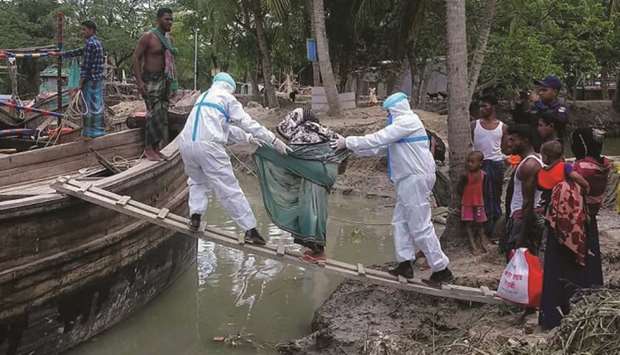Bangladesh began evacuating residents of coastal residents yesterday as a powerful cyclone neared its south-western coast, officials said.
State Minister for Disaster Management Enamur Rahman said that more than 12,000 centres were ready to house some 2.2mn people with cyclone Amphan only 665km away from the southern port of Payra.
The storm, initially categorised a super cyclone with wind speeds of up to 245km per hour (kph), is likely to make landfall with lesser ferocity on Wednesday afternoon, according to Dhaka’s meteorological office.
Wind speeds within 85km of the eye of the cyclone were between 200 and 220kph yesterday afternoon.
Low-laying coastal areas and offshore islands may experience water surge of up to 3m above the normal tide, the office said.
Officials were moving people to higher ground and urged them to maintain social distance and wear masks as the country has recorded over 20,995 coronavirus cases
and 314 deaths so far.
To ensure social distancing in view of the coronavirus pandemic, the number of cyclone shelters has been doubled by using schools, with masks compulsory, Rahman said.
“We are also keeping separate isolation rooms in the shelters for any infected patients,” he added.
Officials intensified rescue operations as the cyclone could trigger the worst storm in about 15 years along the country’s low-lying coast.
Bangladesh’s coast, home to 30mn people is also regularly battered by cyclones that have killed hundreds of thousands of people in recent decades.
Yamin Chowdhury, an official in Bangladesh’s Barisal province, said the coast guard was helping to bring back thousands of people from remote islands.
Fishing boats have been ordered to return to shore and all ports and fish landing stations shut down.
“Coastal dwellers in Bangladesh are facing an impossible choice,” Snigdha Chakraborty from aid group Catholic Relief Services (CRS) said in a statement.
“There is limited space in existing evacuation shelters and people who have been on Covid-19 lockdown might hesitate to leave their less-sturdy homes to go to a central - and possibly crowded - shelter.”
She warned of “grim days ahead”, with poor sanitation, limited access to safe water and health facilities.
The coronavirus lockdown had also cut off many people’s income and eaten up their cash reserves, she added.

Residents being evacuated in Dhalchar village on the island of Bhola as the Cyclone Amphan barrels towards Bangladesh’s coast yesterday.
